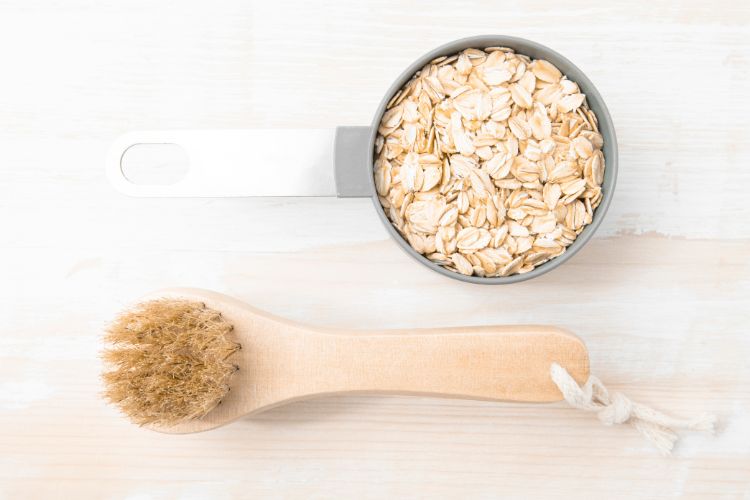Listen to an audio transcription of this post
At Blissy, we think that natural remedies are a great first choice since these don't introduce chemicals or medications right away. Of course, if your itchy skin doesn't clear it, speaking with a dermatologist is a good choice. They can help rule out uncomfortable conditions that require more specific treatments.
Common Causes of Skin Rash
Skin rashes are a common complaint that emergency medicine practitioners encounter frequently. There are several potential causes of skin rashes, with skin allergies being one of the most common. In some cases, a skin rash can be accompanied by swollen skin or other symptoms, indicating an allergic reaction.
Allergic reactions can be caused by a wide range of triggers, including medications, insect bites, and certain foods. It is important to seek medical attention if you experience a skin rash accompanied by other symptoms, especially if you have a history of allergies or are experiencing difficulty breathing.
Poison ivy rashes are a prevalent cause of skin rash and can be especially severe in individuals with allergies. Atopic dermatitis, commonly known as eczema, is another condition that can cause a persistent and itchy rash. Both of these conditions can be managed with proper medical treatment and avoidance of triggers. It is essential to consult a healthcare provider for an accurate diagnosis and appropriate treatment plan to manage any skin rash effectively.
Home Remedies for Skin Rashes, Poison Ivy, Atopic Dermatitis, and Other Causes of Itchy Skin
If you're dealing with an itchy skin rash, try one of these 10 remedies to find relief.
#1. Oatmeal bath

Do you have a skin allergy that's making you a little bit crazy? One of the helpful things you can try is an oatmeal bath. Oatmeal baths relieve itchy skin, but you must use the right kind.
Try colloidal oatmeal, which is a different kind of oatmeal than the type you'd eat. This kind of oatmeal binds to the skin. It helps create a healthier, protective skin barrier that soothes irritated skin and eases inflammatory skin diseases. It cleans your skin, too.
When you take an oatmeal bath, use lukewarm water for a warm bath rather than a hot one, and soak for up to 15 minutes at a time.
#2. Coconut oil

Coconut oil can help relieve itching by helping moisturize your skin. The oil is made up of around 65% medium-chain fatty acids, which soothe dry skin and can even treat mild wounds, like small cracks in the skin.
#3. Witch hazel

For skin inflammation, you can try witch hazel. Applied directly to the affected area, witch hazel treats itching, inflammation, injuries, and irritation. From contact dermatitis to intense itching, the tannins in witch hazel may offer a solution to relieve symptoms.
#4. Aloe vera

Aloe vera gel is well known as a solution for itchy skin or rashes. It is understood to have healing properties. It can also hydrate the skin. With antimicrobial and anti-inflammatory properties, a gel made from this plant may help soothe severe itching. It treats almost any kind of itchy rash.
It's important not to use aloe vera gel if a rash spreads, blisters, or covers your entire body. Also, avoid it if the rash is infected or comes with a fever.
#5. Baking soda

Baking soda helps treat all kinds of skin conditions, such as armpit rashes, redness, burning, and others. It can also soothe bug bites and help reduce itching from insect bites and stings.
#6. Chamomile tea

Chamomile tea is an effective treatment for the skin when used properly. It can help brighten the complexion, reduce acne, minimize the appearance of dark spots, and help with some other skin and medical problems.
Interestingly, one study showed that chamomile extract used on wounds improved healing. This makes chamomile one of several helpful medicinal plants you can easily access at home.
#7. Apple cider vinegar

Apple cider vinegar is a treatment recommended for those with acne or oily skin. It can be used as a toner and has been medically reviewed for safety by dermatologists.
ACV isn't meant to be used straight out of the bottle, so remember that you will need to add water to dilute it. Use only one tablespoon per 8 ounces of water to help with your skin condition.
#8. Tea tree oil

Do you have a nail fungus, lice, athlete's foot, dandruff, acne, or another skin condition? If so, you may want to try tea tree oil for these issues. Tea tree oil can effectively treat and relieve itchiness and irritation from these conditions. It's also generally safe to use on the skin (it should never be taken orally).
Whether you have an insect bite that itches or you want relief from an itchy scalp, tea tree oil may be the solution. However, some medical conditions could be irritated by it, so try it on a small area of the skin first.
#9. Honey

If you need to deeply moisturize your skin, then using honey is a good choice. Honey is a natural humectant and an effective moisturizer. Just a few drops of honey applied to the skin will sink in effectively and moisturize it in minutes. With this helpful ingredient, you can also make body scrubs. Or, make lip oils, facial cleansers, and more.
#10. Blissy's Hypoallergenic Mulberry Silk Pillowcase

If you have an itchy scalp, face, or neck at night, one helpful tip is to switch away from cotton, polyester, or other kinds of materials in your bedding. Instead, opt for a Blissy hypoallergenic mulberry silk pillowcase.
Silk's natural proteins and hypoallergenic properties may help soothe itchy scalps, so you can get better rest. Silk also helps you regulate your body temperature, so your skin doesn't get hot or irritated while sleeping.
Try a Blissy Pillowcase to Get Relief
If you want to find relief, a Blissy pillowcase is a great place to start. Our pillowcases are antibacterial, hypoallergenic, non-irritating, and hydrating. They also "breathe," so you can stay cool all night and help soothe your irritated skin. Check out our website's available pillowcases (and other products, including sleep masks and robes) to find the right products for you.
















































